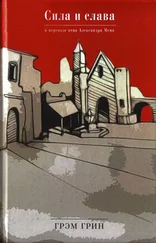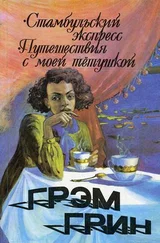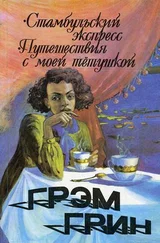Грэм Грин - The Comedians
Здесь есть возможность читать онлайн «Грэм Грин - The Comedians» весь текст электронной книги совершенно бесплатно (целиком полную версию без сокращений). В некоторых случаях можно слушать аудио, скачать через торрент в формате fb2 и присутствует краткое содержание. Год выпуска: 1966, Жанр: Классическая проза, на английском языке. Описание произведения, (предисловие) а так же отзывы посетителей доступны на портале библиотеки ЛибКат.
- Название:The Comedians
- Автор:
- Жанр:
- Год:1966
- ISBN:нет данных
- Рейтинг книги:3 / 5. Голосов: 1
-
Избранное:Добавить в избранное
- Отзывы:
-
Ваша оценка:
- 60
- 1
- 2
- 3
- 4
- 5
The Comedians: краткое содержание, описание и аннотация
Предлагаем к чтению аннотацию, описание, краткое содержание или предисловие (зависит от того, что написал сам автор книги «The Comedians»). Если вы не нашли необходимую информацию о книге — напишите в комментариях, мы постараемся отыскать её.
The Comedians — читать онлайн бесплатно полную книгу (весь текст) целиком
Ниже представлен текст книги, разбитый по страницам. Система сохранения места последней прочитанной страницы, позволяет с удобством читать онлайн бесплатно книгу «The Comedians», без необходимости каждый раз заново искать на чём Вы остановились. Поставьте закладку, и сможете в любой момент перейти на страницу, на которой закончили чтение.
Интервал:
Закладка:
'What did she say?'
'Nothing. She just took off the sheets. And when I see her like that it is always the same.' He started to leave the room, shaking his head as though to get the rain out of his eyes, and then he came hurriedly back, went down on his knees by the bed, and thrust his mouth against the sheet where it was rounded by her stomach. He knelt there in his black suit looking like some negro priest at an obscene rite. It was I, not he, who left the room, and it was I who went to the kitchen and set the servants to work again for the guests' breakfast (even the cook was partly incapacitated by tears), and it was I who telephoned to Doctor Magiot. (The telephone frequently worked in those days.)
'She was a great woman,' Doctor Magiot said to me later, and 'I hardly knew her' was all I could say in my stupefaction.
The next day I went through her papers to find her will. She had not been very tidy: the drawers of her desk were given up indiscriminately to bills and receipts in no order that I could detect; there was a confusion even in the years. Sometimes among a pile of laundry-receipts I came on what used to be called a billet-doux. One in English, written in pencil on the back of a hotel menu, said, 'Yvette, come to me tonight. I am dying slowly. I long for the coup de grеce.' Was it from a hotel guest? I wondered whether she had kept it for the sake of the menu or of the message, for the menu was a very special one for some July 14 celebration.
In another drawer, which otherwise contained mainly tubes of glue, drawing pins, hair-slides, fountain-pen refills and paper-clips was a china pig-bank. The pig was light, but it rattled all the same. I didn't want to break it open, but it seemed foolish to throw it away like that, unexamined, on the growing pile of lumber. When I cracked it apart I found a Monte Carlo roulette token for five francs like the one I had put in the chapel collection many decades ago and a tarnishing medal, attached to a ribbon. I couldn't make out what it was, but when I showed it to Doctor Magiot he recognized it. 'The medal of the Resistance,' he said, and it was then that he added, 'She was a great woman.'
The medal of the Resistance … I had had no communication with my mother during the years of the occupation. Had she earned it or had she filched it or had it been given her as a love-token? Doctor Magiot had no doubt at all, but I had difficulty in thinking of my mother as a heroine, though I had no doubt at all that she could have played the part, as she could have played the grande amoureuse with the English tourists. She had convinced the fathers of the Visitation of her moral rectitude, even against the dubious background of Monte Carlo. I knew very little of her, but enough to recognize an accomplished comedian.
However, though her bills were untidy, there was nothing untidy about her will. It was clear and precise, signed by the Comtesse de Lascot-Villiers and witnessed by Doctor Magiot. She had turned her hotel into a limited company and assigned a nominal share to Marcel, another to Doctor Magiot, and one to her lawyer who was called Alexandre Dubois. Sho possessed the ninety-seven other shares, as well as the three transfers which were neatly pinned to the document. The company owned everything to the last spoon and fork and I was allotted sixty-five shares and Marcel thirty-three. I was to all intents the owner of the Trianon. I could begin at once to realize the dream of the night before — or only with such delay as the quick burial of my mother, a quickness entailed by the climate, presented.
In these arrangements Doctor Magiot proved invaluable; she was transported that very afternoon to the small cemetery in the mountain village of Kenscoff, where she was dug in with due Catholic rites among the small tombs and Marcel wept unashamedly by the grave, which looked like a hole dug for drains in a town street, for all around were the little houses the Haitians constructed for their dead; in them on the Feast of All Souls they would leave their bread and wine. While the ceremonial trowels of earth were deposited on the coffin, I wondered how best I could dispose of Marcel. We had been standing in the gloom of the ink-black clouds which always assembled over the mountain at that hour and now they broke on us with a dash and fury, and we ran for our taxis, the priest in the lead and the gravediggers bringing up the rear. I didn't know it then, but I know now that the diggers would not have returned before the morning to cover up my mother's coffin, for no one will work in a cemetery at night, unless it is a zombie who has left his grave at the command of an houngan to labour during the dark hours.
Doctor Magiot gave me dinner that night at his own home, and in addition he gave me a great deal of good advice which I was unwise enough to discount because I thought he might perhaps have an idea of obtaining the hotel for another client. It was the one share he possessed in my mother's company which made me suspicious even though I held the signed transfer.
He lived on the lower slopes of Pйtionville in a house of three storeys like a miniature version of my own hotel with its tower and its lace-work balconies. In the garden grew a dry spiky Norfolk pine, like an illustration in a Victorian novel, and the only modern object in the room, where we sat after dinner, was the telephone. It was like an oversight in a museum arrangement. The heavy drape of the scarlet curtains, the woollen cloths on the occasional tables with bobbles at each corner, the china objects on the chimney-piece that included two dogs with the same gentle gaze as Doctor Magiot's, the portraits of the doctor's parents (coloured photographs mounted on mauve silk in oval frames), the pleated screen in the unnecessary fireplace, spoke of another age; the literary works in a glass-fronted bookcase (Doctor Magiot kept his professional works in his consulting-room) were bound in old-fashioned calf. I examined them while he was out 'washing his hands', as he put it in polite English. There were Les Misйrables in three volumes, Les Mystиres de Paris with the last volume missing, several of Gaboriau's romans policiers, Renan's Vie de Jйsus, and rather surprisingly among its companions Marx's Das Kapital rebound in exactly the same calf so that it was indistinguishable at a distance from Les Misйrables. The lamp at Doctor Magiot's elbow had a pink glass shade, and quite wisely, for even in those days the electric current was erratic, it was oil-burning.
'You really intend,' Doctor Magiot asked me, 'to take over the hotel?'
'Why not? I have a little experience of restaurant work. I can see great possibilities of improvement. My mother was not catering for the luxury trade.'
'The luxury trade?' Doctor Magiot repeated. 'I think you can hardly depend on that here.'
'Some hotels do.'
'The good years will not always continue. Not very long now and there will be the elections …'
'It doesn't make much difference, does it, who wins?'
'Not to the poor. But to the tourist perhaps.' He put a flowered saucer upon the table beside me — an ash-tray would have been out of period in this room where no one had ever smoked in the old days. He handled the saucer carefully, as though it were of precious porcelain. He was very big and very black, but he possessed great gentleness — he would never ill-treat, I felt sure, even an inanimate object, such as a recalcitrant chair. Nothing can be more inconsiderate to a man ot Doctor Magiot's profession than a telephone. But when it rang once during our conversation he lifted the receiver as gently as he would have raised a patient's wrist.
'You have heard,' Doctor Magiot said, 'of the Emperor Christophe?'
'Of course.'
'Those days could return very easily. More cruelly perhaps and certainly more ignobly. God save us from a little Christophe.'
Читать дальшеИнтервал:
Закладка:
Похожие книги на «The Comedians»
Представляем Вашему вниманию похожие книги на «The Comedians» списком для выбора. Мы отобрали схожую по названию и смыслу литературу в надежде предоставить читателям больше вариантов отыскать новые, интересные, ещё непрочитанные произведения.
Обсуждение, отзывы о книге «The Comedians» и просто собственные мнения читателей. Оставьте ваши комментарии, напишите, что Вы думаете о произведении, его смысле или главных героях. Укажите что конкретно понравилось, а что нет, и почему Вы так считаете.



